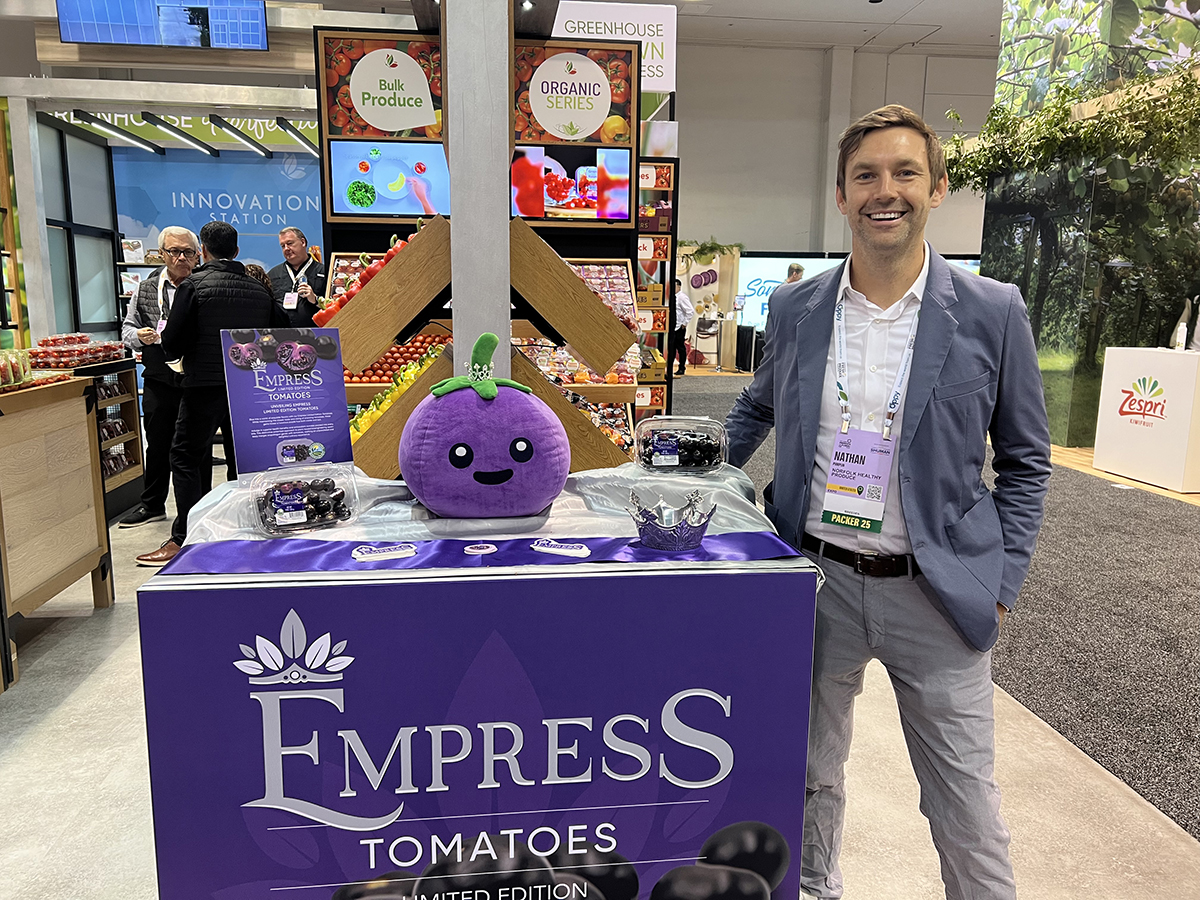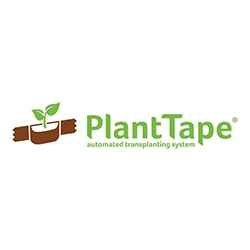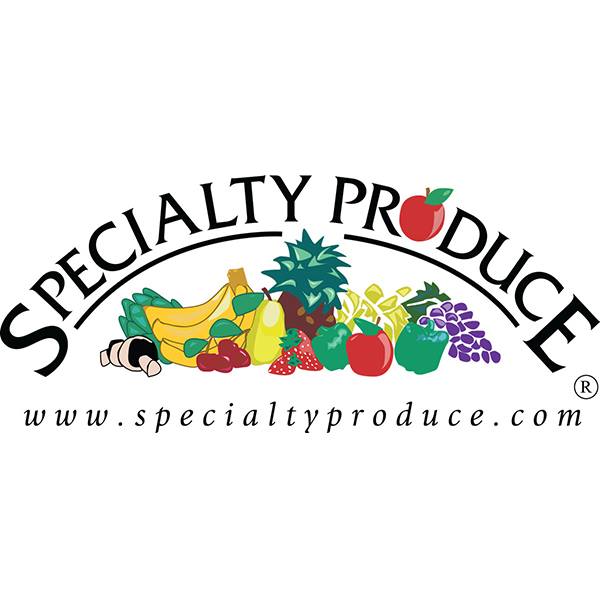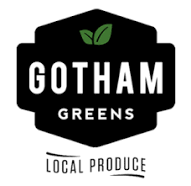The Packer’s Sustainability Insights 2025 survey of growers, retailers and consumers found when it comes to genetically modified organisms (GMOs) or bioengineered produce, while the majority of growers indicate they’re ready to embrace them, consumers are more hesitant.
Sustainability Insights surveyed approximately 500 consumers on their fresh produce purchases and perception of GMOs. When asked: Do you consciously avoid buying products that are genetically modified? Sixty-five percent said yes, and 35% said no. When those who indicated avoiding GMOs were asked what their primary concern was in consuming a genetically modified fruit or vegetable, “chemicals” was the most frequently used word.
Nathan Pumplin, CEO of Norfolk Healthy Produce, the company behind the Empress Purple Tomato, a bioengineered tomato “packed with antioxidants,” says confusion is still holding some consumers back.
“On the consumer side, I think there is still confusion about what a GMO is,” he says. “Asking about a generic GMO is much different than asking about a specific product like a Pinkglow pineapple, Arctic Apples or the Empress Purple Tomato” — all of which are bioengineered.
“When you ask consumers, do you consciously avoid buying products that are genetically modified, I’m not surprised at all that 65% of them say yes. I might expect that number to be even higher,” he says. “But I also would be really interested to then look at their purchase behavior and what they bought over the last month or two in the grocery store. What percentage of them bought foods that have genetically modified ingredients? The answer would be over 95%.
“We also know there is a strong say-do gap between how people answer survey questions and what their eating and purchase behavior is,” he adds.
USDA estimates that up to 80% of all processed foods contain GMOs or GMO derivatives. Given that, Pumplin says unless consumers are buying organic exclusively, they’re already consuming bioengineered food from center store.
“GMOs are purchased way more than non-GMOs, if you look at food in general,” he says. “So, it’s a strange way that we’ve framed GMOs within produce.”
Pumplin says the reason there are fewer GMOs in produce than center store is twofold.
“One, it’s difficult and costly to develop new produce varieties, and the prize wasn’t there,” he explains. “So, the companies that were developing GMOs said, ‘Okay, we’re going for corn, we’re going for soy because other crops don’t make enough money, and it costs us a lot of money to develop them.’”
Pumplin says the second challenge is there haven’t been many GMO products in produce that are differentiated in the eyes of the consumer.
“It’s kind of the chicken or the egg,” he says. “People are not going to develop GMO produce items if there’s not a market for it, and there’s not going to be a market for it if people aren’t developing new products.”
Pumplin says that’s the cycle Norfolk is trying to break with the purple tomato.
“We had to be extremely frugal, extremely cost conscious, as we brought the product to market,” he says. “We had to do it step by step, engaging more and more consumers and heavily engaging with the supply chain all the way along to demonstrate that it’s worthwhile getting out to market.”
Growers Are More Receptive
Another key to breaking the chicken or the egg cycle, Pumplin says, is to offer growers more innovative bioengineered solutions in produce that are disease resistant, use fewer resources to grow and offer more flavor, nutrients and other benefits.
Sustainability Insights surveyed nearly 75 growers, revealing 54% of growers consider GMOs a sustainable solution. And while 80% said they do not currently offer a GMO product, 54% said they would consider a GMO product in the future.
The survey, fielded June and July 2025, included growers across the continental U.S., with 1,324 average acres farmed per respondent and over two-thirds of farmers surveyed over the age of 45.
“It’s interesting the disconnect with growers, where 54% are open to growing a GMO product but currently only 20% offer a biotech product,” Pumplin says. “This suggests that growers don’t yet have enough products and opportunities offered that meet their needs. Meeting that demand is a primary driver for our company.”
Premium Perception
Pumplin was on the USDA Fruit and Vegetable Industry Advisory Committee a couple years ago, when the group gathered in Washington, D.C.
“There was a presentation from the organic certification group, and their big thing was: How do we catch cheaters? Organic is a premium label, and we need to make sure that everything that has an organic label really is organic,” Pumplin recalls. “Then bioengineering came up and [the presenter] said here’s the rules about bioengineering, and here’s how we make sure that anything that is bioengineered has the label on it.
“I raised my hand and said there’s kind of an interesting contrast here,” he continues. “So, what if I have a product that’s not bioengineered, and I put the bioengineered label on it? Will I get in trouble? She laughed and said: ‘Why would anyone ever do that?’ Like that’s the craziest thing. It just shows you that the thinking has been that organic is a premium and bioengineered is a warning.”
The Norfolk Healthy Produce CEO says he’s convinced that’s about to change.
At last month’s International Fresh Produce Association Global Produce and Floral Show in Anaheim, Calif., The Packer spoke with Pumplin at the Red Sun Farms booth where he was sampling the Empress Purple Tomato.
“It’s been nonstop people coming to the booth to sample the purple tomato,” Pumplin said. “It’s received so much attention, and not a single person has said: ‘This is a GMO, I’m not trying it.’ This is our fourth IFPA. The first year we heard: ‘I don’t know. Is it OK?’ Now they’re asking where they can buy purple tomatoes.”
Pumplin says the quantity of purple tomatoes the company brought to IFPA for sampling would usually have lasted two days, but this year they were gone in less than a day.
“I guarantee within five years from now people are going to be competing for developing the new leading GMO produce items once it’s clear that the supply chain will accept them,” he says. “And the supply chain will accept them because the vast majority of consumers want these products.
“I also fully believe that within a few years, bioengineering will be seen as a premium label, and people will reach for bioengineered the same way that they go to organic because it fits their value system,” he adds.
Positive Messaging
Today’s produce consumer is constantly changing and evolving, and Pumplin says it’s time for the industry to change as well.
“In the produce industry, so much of what we do is what we’ve done in the past, and we don’t really want to change it,” he says. “It’s just not possible anymore for the industry to be so — I don’t want to say stuck in the past — but just resistant to innovation, because the customers have moved on, and the industry has not.”
At this intersection of innovation and education, there’s opportunity.
“There haven’t been scientists telling positive stories about GMOs in a way that’s relatable to people,” Pumplin says. “It’s just been a massive gap. We need more engagement, and that message needs to get through to every produce consumer.”
Your next read:
Are Consumers Finally Ready to Embrace GMOs in the Produce Aisle?
Growers, Retailers, Consumers Share Top Sustainability Priorities
Growers Double Down on Sustainability as Key to Profitability


















